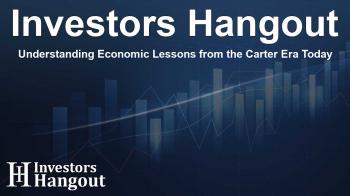Understanding Economic Lessons from the Carter Era Today

Exploring Economic Insights from the Carter Administration
Amid ongoing uncertainty in the financial markets surrounding U.S. inflation and interest rates, Macquarie has looked back in history to extract meaningful insights, focusing on the lessons learned during President Jimmy Carter's administration. These reflections are particularly relevant in today’s mixed economic landscape.
Historical Context of Economic Challenges
The current environment, characterized by inconsistent economic indicators and a heightened awareness of sovereign debt issues, mirrors some of the struggles encountered under Carter's leadership in the late 1970s. During this era, economic difficulties arose that were often beyond the President's influence, yet they significantly shaped the nation's financial landscape.
Macquarie emphasizes that Carter's presidency, which spanned from 1977 to 1981, was marked by severe economic challenges. Despite facing these hardships, his tenure saw essential structural reforms that have had lasting impacts on the U.S. economy.
The Volcker Appointment: A Turning Point
One of Carter's most critical decisions was the appointment of Paul Volcker as Chairman of the Federal Reserve. This move is often credited with guiding the nation through a period known as stagflation—a combination of rising inflation and stagnant economic growth—offering a template for tackling similar issues today.
The Importance of an Independent Federal Reserve
Macquarie’s report suggests that one of the pivotal lessons from the Carter era remains the necessity for an independent Federal Reserve. This autonomy is vital in managing the economy effectively, especially during turbulent times.
Strategic Foreign Policy Doctrine
Another critical takeaway is the significance of having a well-defined foreign policy strategy. In an increasingly interconnected global market, a coherent approach can enhance international relations and stability, which are crucial for economic health.
Navigating Today's Economic Landscape
As traders today grapple with uncertainty driven by inconsistent labor market data and speculation around the upcoming employment report, Macquarie advises a watchful eye on the unemployment rate, which they project may increase to 4.3%. This projection indicates growing concerns about job stability and economic resilience.
Furthermore, global markets are facing challenges from rising bond yields, particularly in parts of the UK, where worries about sovereign risk are escalating. These issues further complicate the economic landscape as policymakers seek to find clarity amidst the noise.
Learning from the Past to Shape the Future
In essence, the lessons gleaned from the Carter administration offer crucial guidance for today's policymakers. Macquarie underscores the necessity for assertive economic leadership and thoughtful decision-making, particularly as the world experiences renewed inflationary pressures and fiscal challenges.
Frequently Asked Questions
What were the significant economic challenges during Carter's presidency?
Carter faced high inflation and economic stagnation, known as stagflation, which posed numerous challenges for his administration.
How did Paul Volcker influence U.S. economic policy?
Volcker's appointment as Fed Chairman was pivotal in controlling inflation through tight monetary policies, which helped stabilize the economy.
Why is an independent Federal Reserve important?
An independent Fed is essential for making unbiased decisions that support long-term economic stability without political interference.
What similarities exist between current and past economic conditions?
Today's economy shares traits with the late 1970s, particularly in terms of inflation concerns and labor market uncertainties.
What can modern policymakers learn from Carter's era?
Current leaders can draw lessons on the importance of strong economic governance and clear foreign policy strategies to mitigate similar challenges.
About Investors Hangout
Investors Hangout is a leading online stock forum for financial discussion and learning, offering a wide range of free tools and resources. It draws in traders of all levels, who exchange market knowledge, investigate trading tactics, and keep an eye on industry developments in real time. Featuring financial articles, stock message boards, quotes, charts, company profiles, and live news updates. Through cooperative learning and a wealth of informational resources, it helps users from novices creating their first portfolios to experts honing their techniques. Join Investors Hangout today: https://investorshangout.com/
Disclaimer: The content of this article is solely for general informational purposes only; it does not represent legal, financial, or investment advice. Investors Hangout does not offer financial advice; the author is not a licensed financial advisor. Consult a qualified advisor before making any financial or investment decisions based on this article. The author's interpretation of publicly available data presented here; as a result, they should not be taken as advice to purchase, sell, or hold any securities mentioned or any other investments. If any of the material offered here is inaccurate, please contact us for corrections.
